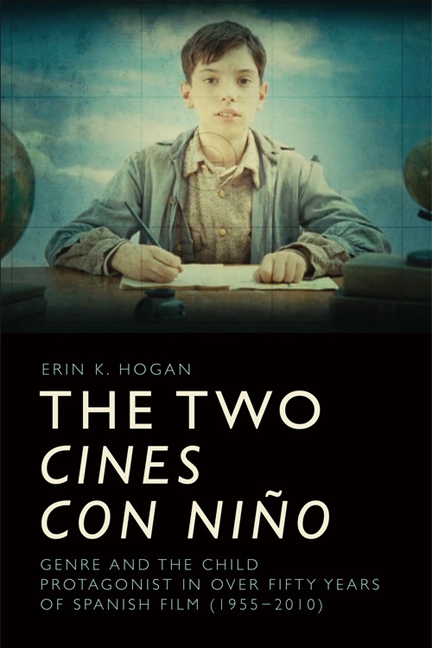Book contents
- Frontmatter
- Contents
- List of Figures
- Acknowledgements
- Figure Permissions
- Introduction The Two Cines Con Niño: The Ventriloquism, Dialogism and Biopolitics of the Children of Franco in Genre Film
- 1 The Black Market and the Stolen Children of Franco in Demonios En El Jardín
- 2 The Appropriative and Carnivalesque Ventriloquism of Altar Boys from Joselito in El pequeño ruiseñor to Ignacio in La mala Educación
- 3 Ventriloquism, Kidnapping and the Carnivalesque in Marisol’s Tómbola
- 4 Adopting, Adapting and Appropriating in the cines con niño: Un rayo de luz and El viaje de Carol
- 5 Prosopopeia and the Gothic Child from Marcelino pan y vino to El Orfanato
- 6 Dialogism and Ritual Function of the Nuevo Cine Con Niño: El Espíritu De La Colmena, Secretos Del Corazón And El Laberinto Del Fauno
- 7 Queering Post-war Childhood in Urte Ilunak and Pa Negre
- 8 The Transatlantic Dialogism in Narrative and Aesthetics of Bildungsfilms: La Lengua De Las Mariposas, Machuca, El Espíritu De La Colmena, El Premio, El Laberinto Del Fauno And Infancia Clandestina
- Conclusion Spanish Movies: Genre, Nation and Spanish Movie
- Select Filmography
- Select Bibliography
- Index
3 - Ventriloquism, Kidnapping and the Carnivalesque in Marisol’s Tómbola
Published online by Cambridge University Press: 01 May 2021
- Frontmatter
- Contents
- List of Figures
- Acknowledgements
- Figure Permissions
- Introduction The Two Cines Con Niño: The Ventriloquism, Dialogism and Biopolitics of the Children of Franco in Genre Film
- 1 The Black Market and the Stolen Children of Franco in Demonios En El Jardín
- 2 The Appropriative and Carnivalesque Ventriloquism of Altar Boys from Joselito in El pequeño ruiseñor to Ignacio in La mala Educación
- 3 Ventriloquism, Kidnapping and the Carnivalesque in Marisol’s Tómbola
- 4 Adopting, Adapting and Appropriating in the cines con niño: Un rayo de luz and El viaje de Carol
- 5 Prosopopeia and the Gothic Child from Marcelino pan y vino to El Orfanato
- 6 Dialogism and Ritual Function of the Nuevo Cine Con Niño: El Espíritu De La Colmena, Secretos Del Corazón And El Laberinto Del Fauno
- 7 Queering Post-war Childhood in Urte Ilunak and Pa Negre
- 8 The Transatlantic Dialogism in Narrative and Aesthetics of Bildungsfilms: La Lengua De Las Mariposas, Machuca, El Espíritu De La Colmena, El Premio, El Laberinto Del Fauno And Infancia Clandestina
- Conclusion Spanish Movies: Genre, Nation and Spanish Movie
- Select Filmography
- Select Bibliography
- Index
Summary
‘Y quería hacer de mí el modelo de niña inocente, conformista y buena, para que fuera la referencia de todos los niños de nuestra generación, tan traumatizada y despersonalizada, que tenían que ser los continuadores del fascismo’
(Pepa Flores cited in Morales 1979: 27)[And he wanted to make me into the model of an innocent girl, conformist and good, so that I would be a reference for all the children of our generation, as traumatised and depersonalised as the continuers of fascism had to be.]
Introduction
The success of the biggest child star of the 1960s, Marisol (Pepa Flores), followed that of her male counterparts of the 1950s, Pablito Calvo and Joselito. Marisol's stardom continued the cine con niño genre of child-starred films through the 1960s in the company of fellow child actresses Ana Belén, Rocío Durcal, and twins Pili and Mili. Chapter Three further elaborates ventriloquism as an expression of Francoist anxiety of subaltern rebellion by children and colonial subjects and as a tool for the transmission of traditional gender roles. In fact, both a 1960 guide for women under Franco, by the Sección Femenina de la Falange, and a 1963 manual for ventriloquists are instructive in Marisol's gendered and biopolitical re-education. Ventriloquism, which appears in symbolic form through the interactions of characters and films throughout The Two cines, is incarnated in the character of the ventriloquist Joe Carter (Rafael Alonso) in Tómbola. But his ventriloquism extends beyond his dummy Marisol. The child protagonist's paternalism towards her best friend, who is likely from Spanish Guinea, supports an allegorical analysis of the biopolitics of Spanish colonialism in Africa. María Belén's character (Joëlle Rivero) invokes the colonial relationship between Spain and Africa, and thus the outcome of territorial appropriation. The ‘musa blanca’ (white muse’s) sidekick María Belén is, effectively, the dummy's dummy. Tómbola chill ingly reveals the Francoist ideological genre function and children as Franco's colonised subjects.
I continue to trace the counter-hegemonic nature of the viejo cine español's child-starred films. Thereby, I focus on the slippage between its distillation of Francoist values and their perversity in the film's fable of the taming and domestication of a wayward girl.
- Type
- Chapter
- Information
- The Two cines con niñoGenre and the Child Protagonist in Fifty Years of Spanish Film (1955–2010), pp. 64 - 87Publisher: Edinburgh University PressPrint publication year: 2018



